Procurement Contract Analysis: Managing Risks in Sidra's Supply Chain
VerifiedAdded on 2023/05/27
|18
|4730
|424
Report
AI Summary
This report provides an in-depth analysis of procurement contracts at Sidra Medical and Research Center, examining how the organization manages various risks inherent in its supply chain. The study emphasizes the significance of procurement management for business organizations, particularly in sectors like healthcare where the quality of materials directly impacts patient safety and outcomes. The report explores Sidra's procurement processes, including tendering procedures, contract terms and conditions, and the role of contracts in mitigating risks associated with poor quality, delays, increased costs, and unethical practices. It highlights the importance of establishing clear quality parameters, specifying timeframes, and incorporating measures to address potential issues like the "battle of forms." Furthermore, the report discusses the use of performance measures and key performance indicators (KPIs) to monitor supplier performance and ensure compliance with contractual obligations. The analysis underscores the critical role of procurement in Sidra's overall operational success and financial sustainability, emphasizing the need for robust contract management to safeguard the organization against potential risks. The report concludes with recommendations for strengthening procurement strategies and ensuring effective risk management within Sidra's supply chain.
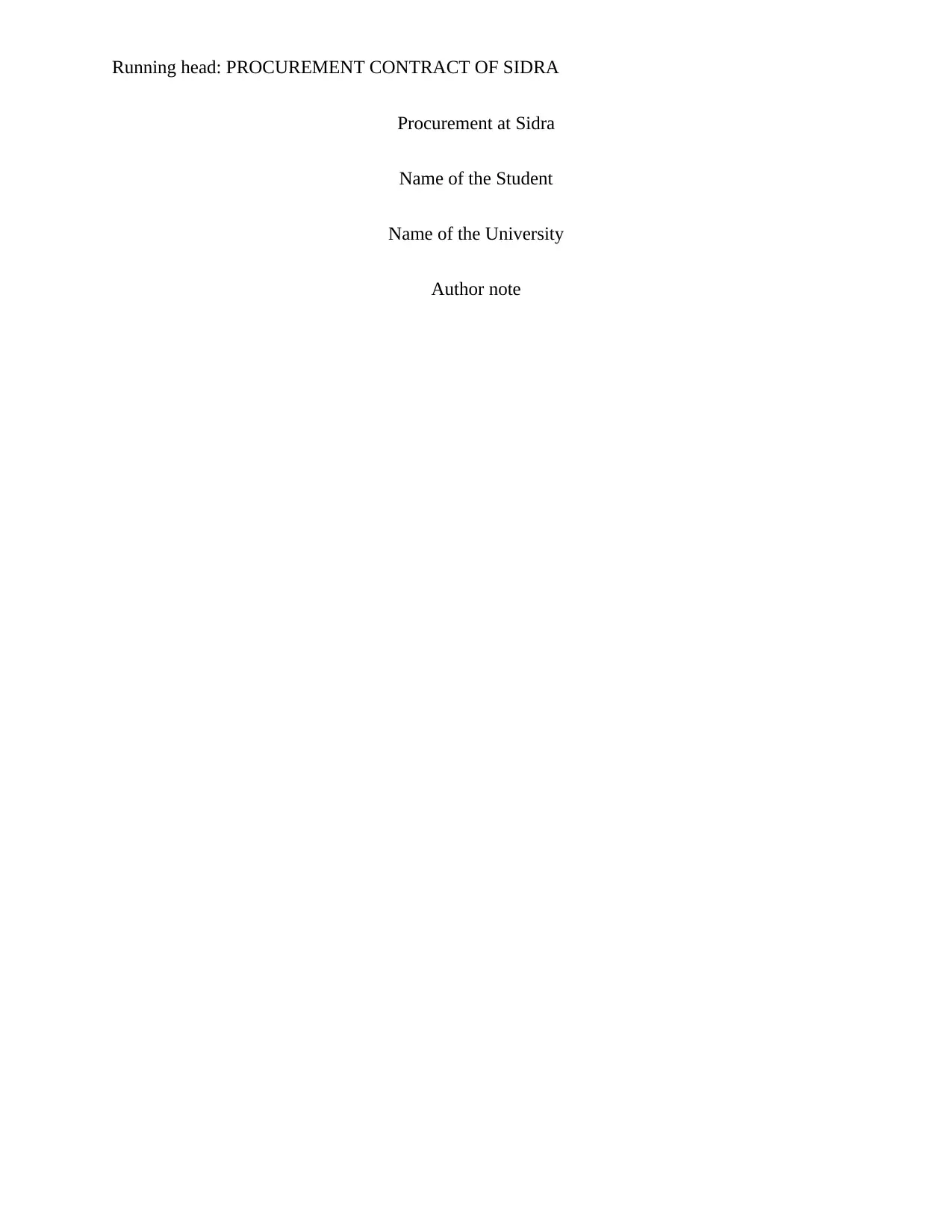
Running head: PROCUREMENT CONTRACT OF SIDRA
Procurement at Sidra
Name of the Student
Name of the University
Author note
Procurement at Sidra
Name of the Student
Name of the University
Author note
Paraphrase This Document
Need a fresh take? Get an instant paraphrase of this document with our AI Paraphraser
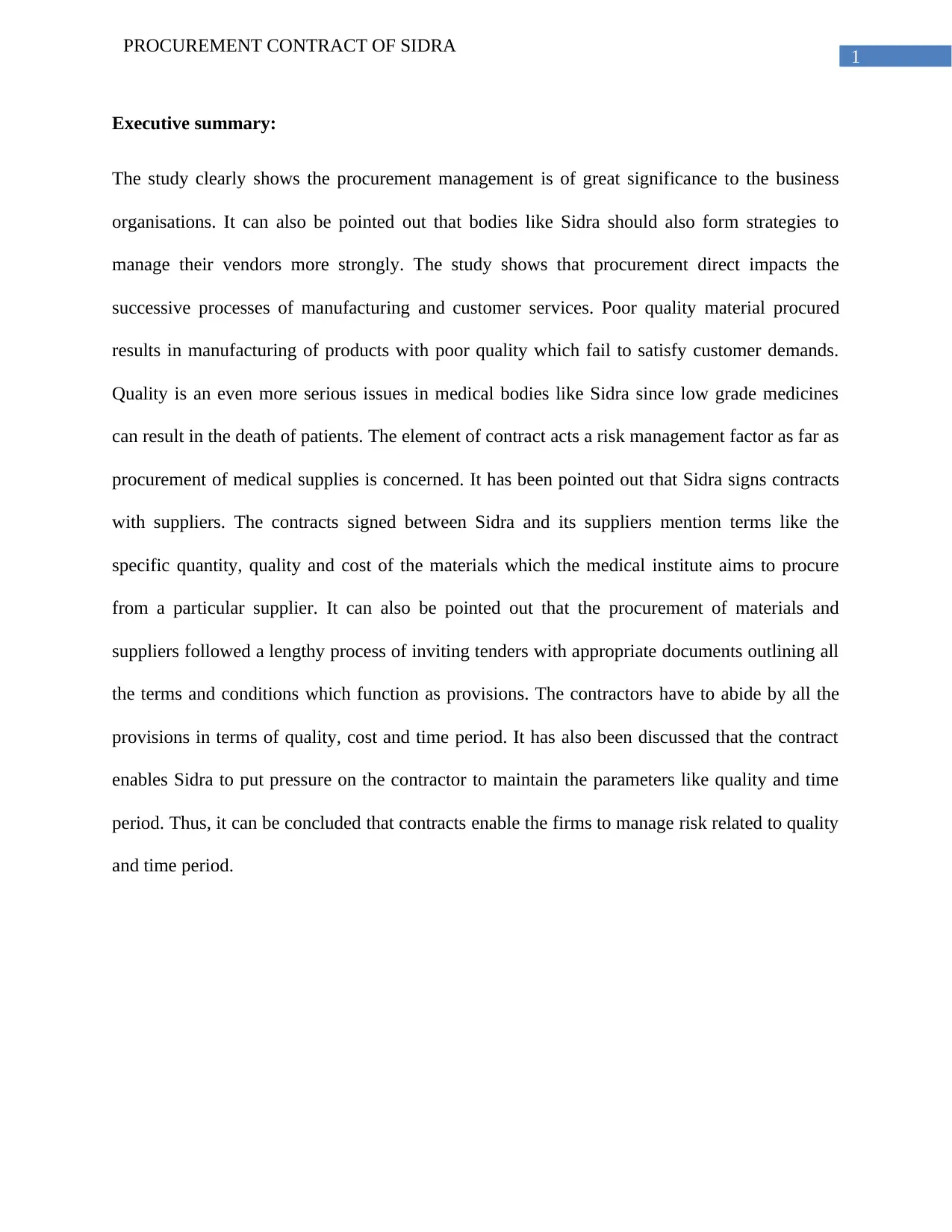
1
PROCUREMENT CONTRACT OF SIDRA
Executive summary:
The study clearly shows the procurement management is of great significance to the business
organisations. It can also be pointed out that bodies like Sidra should also form strategies to
manage their vendors more strongly. The study shows that procurement direct impacts the
successive processes of manufacturing and customer services. Poor quality material procured
results in manufacturing of products with poor quality which fail to satisfy customer demands.
Quality is an even more serious issues in medical bodies like Sidra since low grade medicines
can result in the death of patients. The element of contract acts a risk management factor as far as
procurement of medical supplies is concerned. It has been pointed out that Sidra signs contracts
with suppliers. The contracts signed between Sidra and its suppliers mention terms like the
specific quantity, quality and cost of the materials which the medical institute aims to procure
from a particular supplier. It can also be pointed out that the procurement of materials and
suppliers followed a lengthy process of inviting tenders with appropriate documents outlining all
the terms and conditions which function as provisions. The contractors have to abide by all the
provisions in terms of quality, cost and time period. It has also been discussed that the contract
enables Sidra to put pressure on the contractor to maintain the parameters like quality and time
period. Thus, it can be concluded that contracts enable the firms to manage risk related to quality
and time period.
PROCUREMENT CONTRACT OF SIDRA
Executive summary:
The study clearly shows the procurement management is of great significance to the business
organisations. It can also be pointed out that bodies like Sidra should also form strategies to
manage their vendors more strongly. The study shows that procurement direct impacts the
successive processes of manufacturing and customer services. Poor quality material procured
results in manufacturing of products with poor quality which fail to satisfy customer demands.
Quality is an even more serious issues in medical bodies like Sidra since low grade medicines
can result in the death of patients. The element of contract acts a risk management factor as far as
procurement of medical supplies is concerned. It has been pointed out that Sidra signs contracts
with suppliers. The contracts signed between Sidra and its suppliers mention terms like the
specific quantity, quality and cost of the materials which the medical institute aims to procure
from a particular supplier. It can also be pointed out that the procurement of materials and
suppliers followed a lengthy process of inviting tenders with appropriate documents outlining all
the terms and conditions which function as provisions. The contractors have to abide by all the
provisions in terms of quality, cost and time period. It has also been discussed that the contract
enables Sidra to put pressure on the contractor to maintain the parameters like quality and time
period. Thus, it can be concluded that contracts enable the firms to manage risk related to quality
and time period.
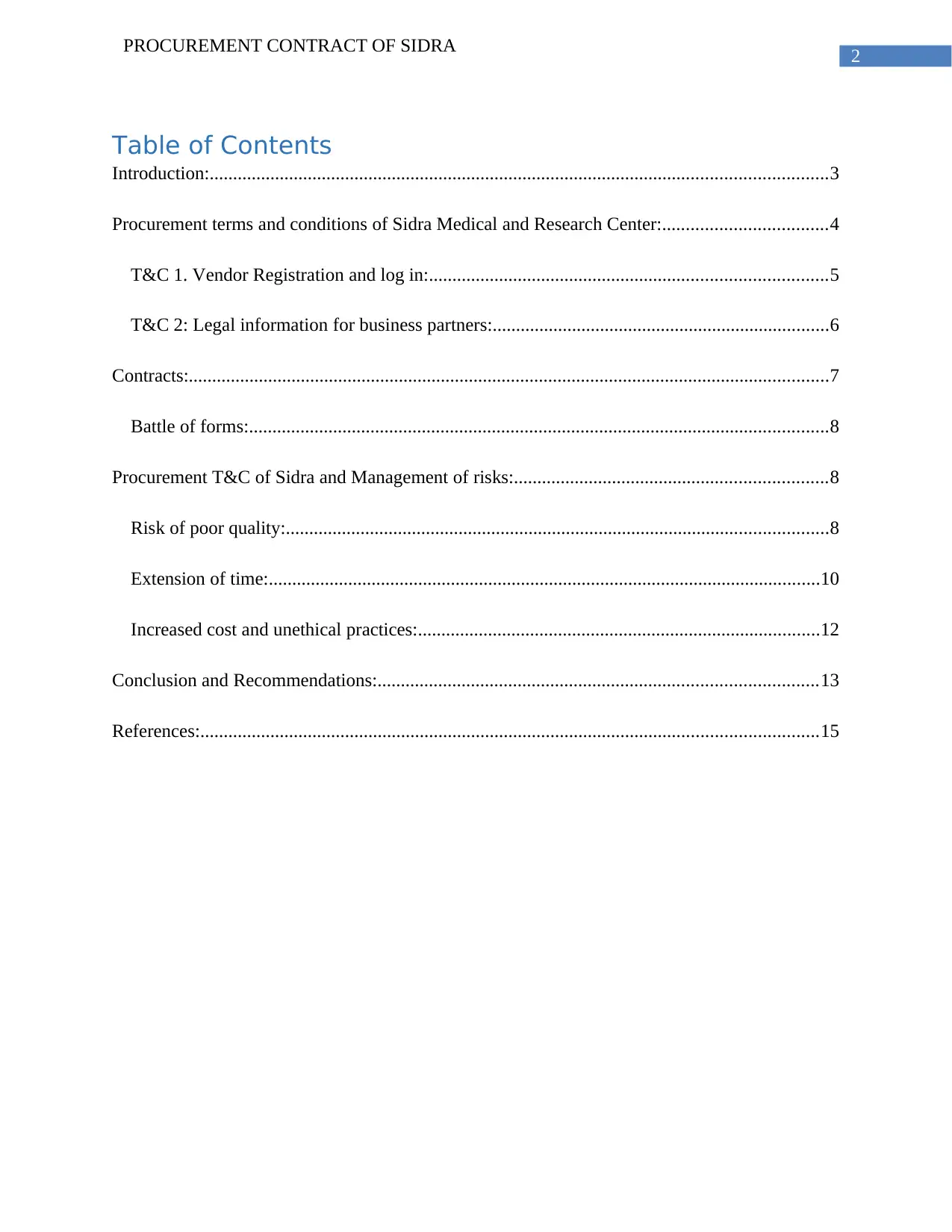
2
PROCUREMENT CONTRACT OF SIDRA
Table of Contents
Introduction:....................................................................................................................................3
Procurement terms and conditions of Sidra Medical and Research Center:...................................4
T&C 1. Vendor Registration and log in:.....................................................................................5
T&C 2: Legal information for business partners:........................................................................6
Contracts:.........................................................................................................................................7
Battle of forms:............................................................................................................................8
Procurement T&C of Sidra and Management of risks:...................................................................8
Risk of poor quality:....................................................................................................................8
Extension of time:......................................................................................................................10
Increased cost and unethical practices:......................................................................................12
Conclusion and Recommendations:..............................................................................................13
References:....................................................................................................................................15
PROCUREMENT CONTRACT OF SIDRA
Table of Contents
Introduction:....................................................................................................................................3
Procurement terms and conditions of Sidra Medical and Research Center:...................................4
T&C 1. Vendor Registration and log in:.....................................................................................5
T&C 2: Legal information for business partners:........................................................................6
Contracts:.........................................................................................................................................7
Battle of forms:............................................................................................................................8
Procurement T&C of Sidra and Management of risks:...................................................................8
Risk of poor quality:....................................................................................................................8
Extension of time:......................................................................................................................10
Increased cost and unethical practices:......................................................................................12
Conclusion and Recommendations:..............................................................................................13
References:....................................................................................................................................15
⊘ This is a preview!⊘
Do you want full access?
Subscribe today to unlock all pages.

Trusted by 1+ million students worldwide
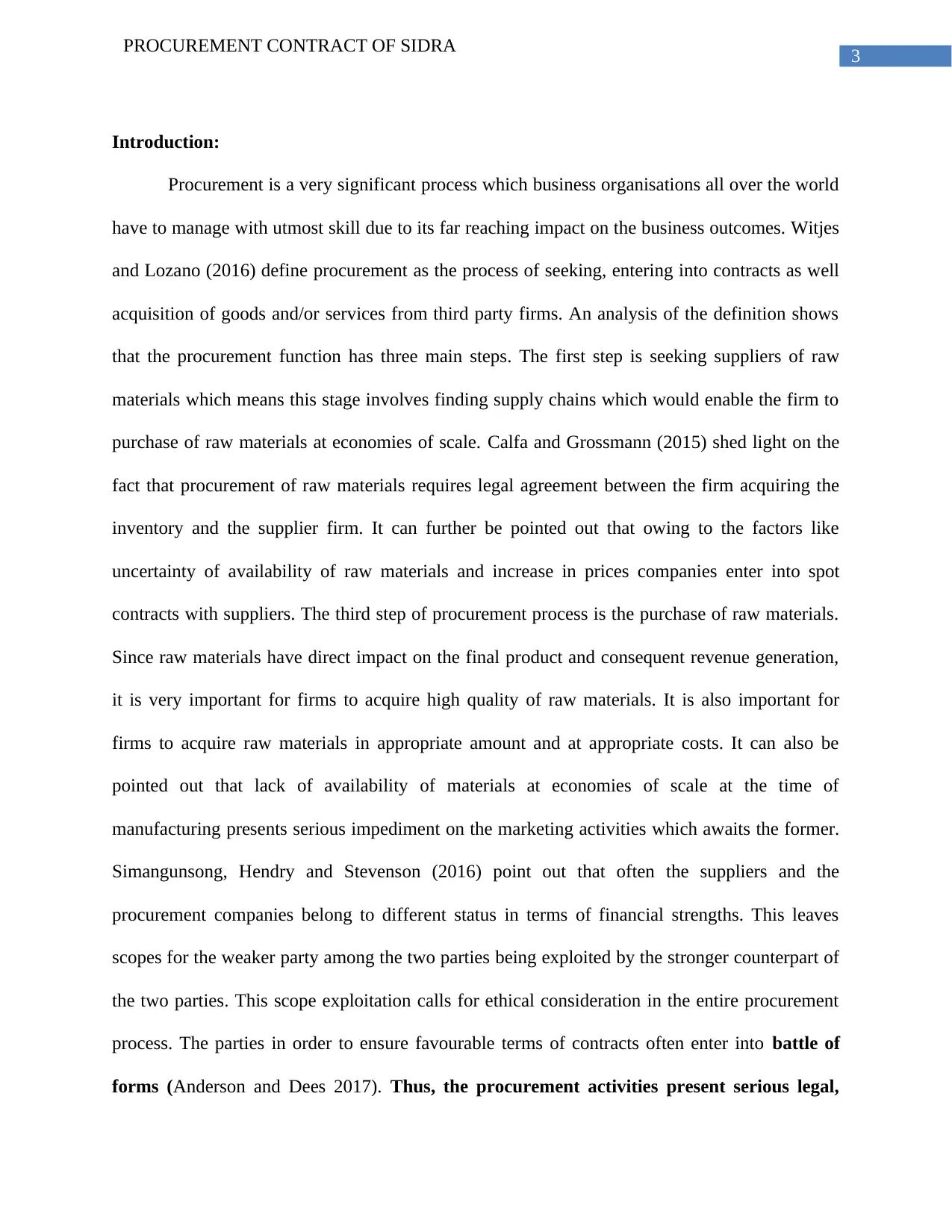
3
PROCUREMENT CONTRACT OF SIDRA
Introduction:
Procurement is a very significant process which business organisations all over the world
have to manage with utmost skill due to its far reaching impact on the business outcomes. Witjes
and Lozano (2016) define procurement as the process of seeking, entering into contracts as well
acquisition of goods and/or services from third party firms. An analysis of the definition shows
that the procurement function has three main steps. The first step is seeking suppliers of raw
materials which means this stage involves finding supply chains which would enable the firm to
purchase of raw materials at economies of scale. Calfa and Grossmann (2015) shed light on the
fact that procurement of raw materials requires legal agreement between the firm acquiring the
inventory and the supplier firm. It can further be pointed out that owing to the factors like
uncertainty of availability of raw materials and increase in prices companies enter into spot
contracts with suppliers. The third step of procurement process is the purchase of raw materials.
Since raw materials have direct impact on the final product and consequent revenue generation,
it is very important for firms to acquire high quality of raw materials. It is also important for
firms to acquire raw materials in appropriate amount and at appropriate costs. It can also be
pointed out that lack of availability of materials at economies of scale at the time of
manufacturing presents serious impediment on the marketing activities which awaits the former.
Simangunsong, Hendry and Stevenson (2016) point out that often the suppliers and the
procurement companies belong to different status in terms of financial strengths. This leaves
scopes for the weaker party among the two parties being exploited by the stronger counterpart of
the two parties. This scope exploitation calls for ethical consideration in the entire procurement
process. The parties in order to ensure favourable terms of contracts often enter into battle of
forms (Anderson and Dees 2017). Thus, the procurement activities present serious legal,
PROCUREMENT CONTRACT OF SIDRA
Introduction:
Procurement is a very significant process which business organisations all over the world
have to manage with utmost skill due to its far reaching impact on the business outcomes. Witjes
and Lozano (2016) define procurement as the process of seeking, entering into contracts as well
acquisition of goods and/or services from third party firms. An analysis of the definition shows
that the procurement function has three main steps. The first step is seeking suppliers of raw
materials which means this stage involves finding supply chains which would enable the firm to
purchase of raw materials at economies of scale. Calfa and Grossmann (2015) shed light on the
fact that procurement of raw materials requires legal agreement between the firm acquiring the
inventory and the supplier firm. It can further be pointed out that owing to the factors like
uncertainty of availability of raw materials and increase in prices companies enter into spot
contracts with suppliers. The third step of procurement process is the purchase of raw materials.
Since raw materials have direct impact on the final product and consequent revenue generation,
it is very important for firms to acquire high quality of raw materials. It is also important for
firms to acquire raw materials in appropriate amount and at appropriate costs. It can also be
pointed out that lack of availability of materials at economies of scale at the time of
manufacturing presents serious impediment on the marketing activities which awaits the former.
Simangunsong, Hendry and Stevenson (2016) point out that often the suppliers and the
procurement companies belong to different status in terms of financial strengths. This leaves
scopes for the weaker party among the two parties being exploited by the stronger counterpart of
the two parties. This scope exploitation calls for ethical consideration in the entire procurement
process. The parties in order to ensure favourable terms of contracts often enter into battle of
forms (Anderson and Dees 2017). Thus, the procurement activities present serious legal,
Paraphrase This Document
Need a fresh take? Get an instant paraphrase of this document with our AI Paraphraser
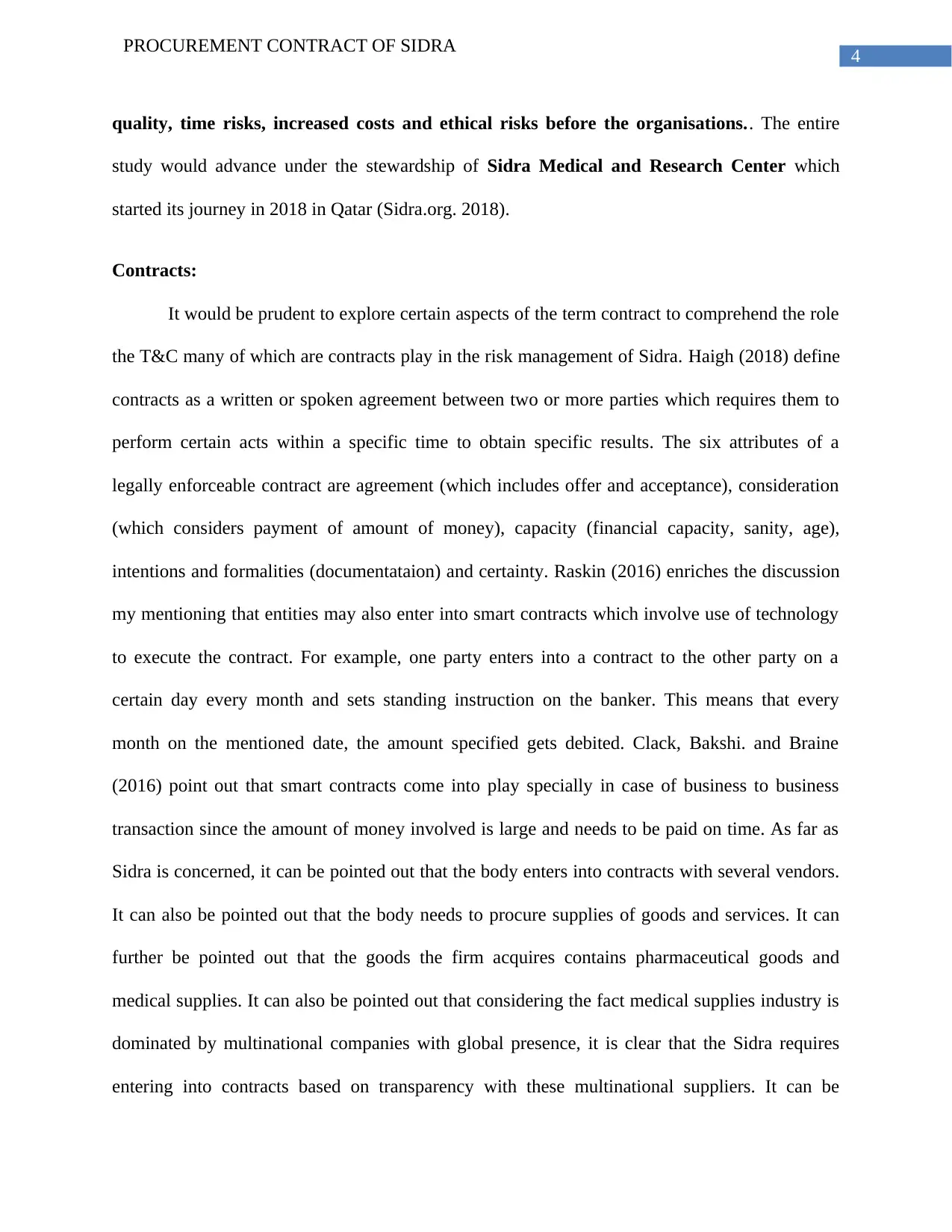
4
PROCUREMENT CONTRACT OF SIDRA
quality, time risks, increased costs and ethical risks before the organisations.. The entire
study would advance under the stewardship of Sidra Medical and Research Center which
started its journey in 2018 in Qatar (Sidra.org. 2018).
Contracts:
It would be prudent to explore certain aspects of the term contract to comprehend the role
the T&C many of which are contracts play in the risk management of Sidra. Haigh (2018) define
contracts as a written or spoken agreement between two or more parties which requires them to
perform certain acts within a specific time to obtain specific results. The six attributes of a
legally enforceable contract are agreement (which includes offer and acceptance), consideration
(which considers payment of amount of money), capacity (financial capacity, sanity, age),
intentions and formalities (documentataion) and certainty. Raskin (2016) enriches the discussion
my mentioning that entities may also enter into smart contracts which involve use of technology
to execute the contract. For example, one party enters into a contract to the other party on a
certain day every month and sets standing instruction on the banker. This means that every
month on the mentioned date, the amount specified gets debited. Clack, Bakshi. and Braine
(2016) point out that smart contracts come into play specially in case of business to business
transaction since the amount of money involved is large and needs to be paid on time. As far as
Sidra is concerned, it can be pointed out that the body enters into contracts with several vendors.
It can also be pointed out that the body needs to procure supplies of goods and services. It can
further be pointed out that the goods the firm acquires contains pharmaceutical goods and
medical supplies. It can also be pointed out that considering the fact medical supplies industry is
dominated by multinational companies with global presence, it is clear that the Sidra requires
entering into contracts based on transparency with these multinational suppliers. It can be
PROCUREMENT CONTRACT OF SIDRA
quality, time risks, increased costs and ethical risks before the organisations.. The entire
study would advance under the stewardship of Sidra Medical and Research Center which
started its journey in 2018 in Qatar (Sidra.org. 2018).
Contracts:
It would be prudent to explore certain aspects of the term contract to comprehend the role
the T&C many of which are contracts play in the risk management of Sidra. Haigh (2018) define
contracts as a written or spoken agreement between two or more parties which requires them to
perform certain acts within a specific time to obtain specific results. The six attributes of a
legally enforceable contract are agreement (which includes offer and acceptance), consideration
(which considers payment of amount of money), capacity (financial capacity, sanity, age),
intentions and formalities (documentataion) and certainty. Raskin (2016) enriches the discussion
my mentioning that entities may also enter into smart contracts which involve use of technology
to execute the contract. For example, one party enters into a contract to the other party on a
certain day every month and sets standing instruction on the banker. This means that every
month on the mentioned date, the amount specified gets debited. Clack, Bakshi. and Braine
(2016) point out that smart contracts come into play specially in case of business to business
transaction since the amount of money involved is large and needs to be paid on time. As far as
Sidra is concerned, it can be pointed out that the body enters into contracts with several vendors.
It can also be pointed out that the body needs to procure supplies of goods and services. It can
further be pointed out that the goods the firm acquires contains pharmaceutical goods and
medical supplies. It can also be pointed out that considering the fact medical supplies industry is
dominated by multinational companies with global presence, it is clear that the Sidra requires
entering into contracts based on transparency with these multinational suppliers. It can be
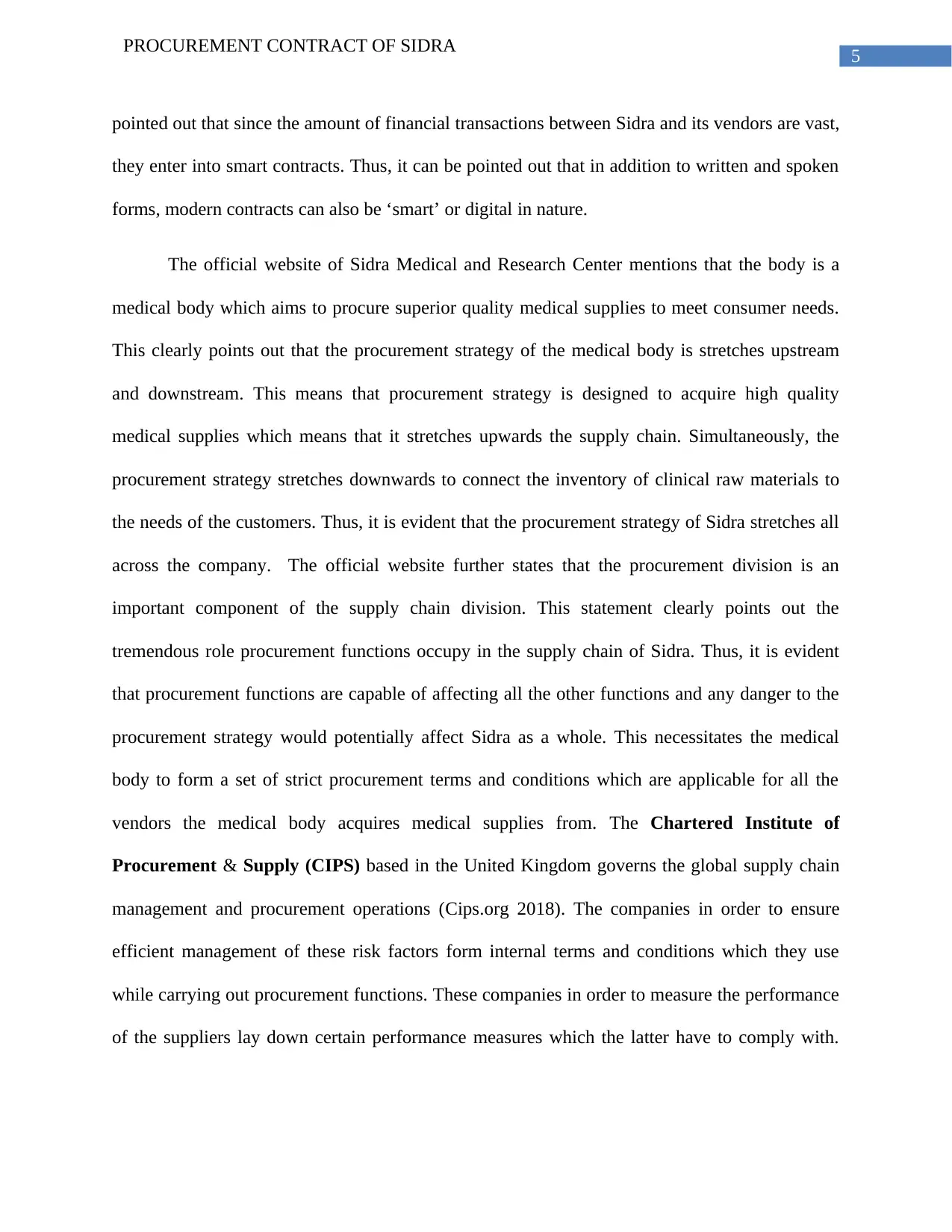
5
PROCUREMENT CONTRACT OF SIDRA
pointed out that since the amount of financial transactions between Sidra and its vendors are vast,
they enter into smart contracts. Thus, it can be pointed out that in addition to written and spoken
forms, modern contracts can also be ‘smart’ or digital in nature.
The official website of Sidra Medical and Research Center mentions that the body is a
medical body which aims to procure superior quality medical supplies to meet consumer needs.
This clearly points out that the procurement strategy of the medical body is stretches upstream
and downstream. This means that procurement strategy is designed to acquire high quality
medical supplies which means that it stretches upwards the supply chain. Simultaneously, the
procurement strategy stretches downwards to connect the inventory of clinical raw materials to
the needs of the customers. Thus, it is evident that the procurement strategy of Sidra stretches all
across the company. The official website further states that the procurement division is an
important component of the supply chain division. This statement clearly points out the
tremendous role procurement functions occupy in the supply chain of Sidra. Thus, it is evident
that procurement functions are capable of affecting all the other functions and any danger to the
procurement strategy would potentially affect Sidra as a whole. This necessitates the medical
body to form a set of strict procurement terms and conditions which are applicable for all the
vendors the medical body acquires medical supplies from. The Chartered Institute of
Procurement & Supply (CIPS) based in the United Kingdom governs the global supply chain
management and procurement operations (Cips.org 2018). The companies in order to ensure
efficient management of these risk factors form internal terms and conditions which they use
while carrying out procurement functions. These companies in order to measure the performance
of the suppliers lay down certain performance measures which the latter have to comply with.
PROCUREMENT CONTRACT OF SIDRA
pointed out that since the amount of financial transactions between Sidra and its vendors are vast,
they enter into smart contracts. Thus, it can be pointed out that in addition to written and spoken
forms, modern contracts can also be ‘smart’ or digital in nature.
The official website of Sidra Medical and Research Center mentions that the body is a
medical body which aims to procure superior quality medical supplies to meet consumer needs.
This clearly points out that the procurement strategy of the medical body is stretches upstream
and downstream. This means that procurement strategy is designed to acquire high quality
medical supplies which means that it stretches upwards the supply chain. Simultaneously, the
procurement strategy stretches downwards to connect the inventory of clinical raw materials to
the needs of the customers. Thus, it is evident that the procurement strategy of Sidra stretches all
across the company. The official website further states that the procurement division is an
important component of the supply chain division. This statement clearly points out the
tremendous role procurement functions occupy in the supply chain of Sidra. Thus, it is evident
that procurement functions are capable of affecting all the other functions and any danger to the
procurement strategy would potentially affect Sidra as a whole. This necessitates the medical
body to form a set of strict procurement terms and conditions which are applicable for all the
vendors the medical body acquires medical supplies from. The Chartered Institute of
Procurement & Supply (CIPS) based in the United Kingdom governs the global supply chain
management and procurement operations (Cips.org 2018). The companies in order to ensure
efficient management of these risk factors form internal terms and conditions which they use
while carrying out procurement functions. These companies in order to measure the performance
of the suppliers lay down certain performance measures which the latter have to comply with.
⊘ This is a preview!⊘
Do you want full access?
Subscribe today to unlock all pages.

Trusted by 1+ million students worldwide
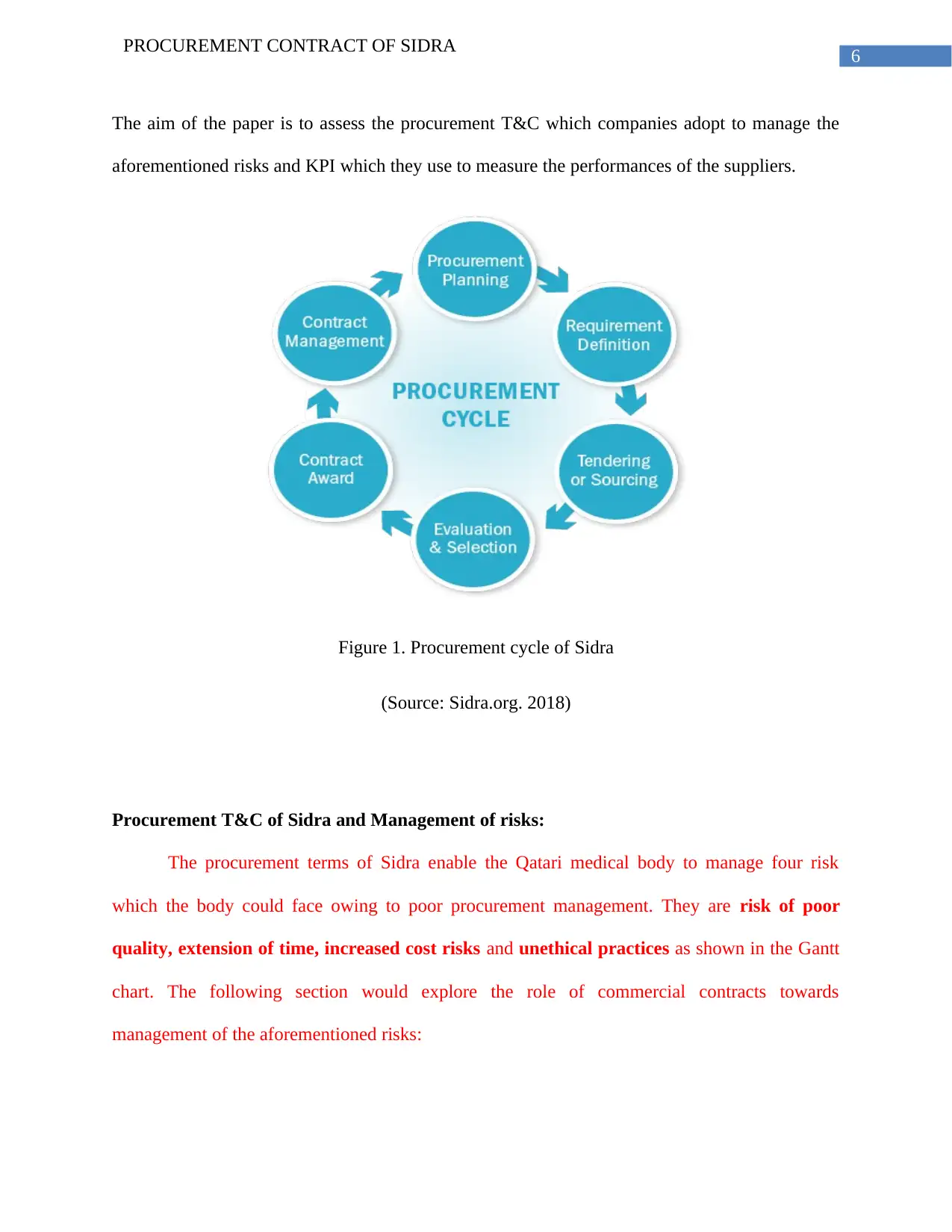
6
PROCUREMENT CONTRACT OF SIDRA
The aim of the paper is to assess the procurement T&C which companies adopt to manage the
aforementioned risks and KPI which they use to measure the performances of the suppliers.
Figure 1. Procurement cycle of Sidra
(Source: Sidra.org. 2018)
Procurement T&C of Sidra and Management of risks:
The procurement terms of Sidra enable the Qatari medical body to manage four risk
which the body could face owing to poor procurement management. They are risk of poor
quality, extension of time, increased cost risks and unethical practices as shown in the Gantt
chart. The following section would explore the role of commercial contracts towards
management of the aforementioned risks:
PROCUREMENT CONTRACT OF SIDRA
The aim of the paper is to assess the procurement T&C which companies adopt to manage the
aforementioned risks and KPI which they use to measure the performances of the suppliers.
Figure 1. Procurement cycle of Sidra
(Source: Sidra.org. 2018)
Procurement T&C of Sidra and Management of risks:
The procurement terms of Sidra enable the Qatari medical body to manage four risk
which the body could face owing to poor procurement management. They are risk of poor
quality, extension of time, increased cost risks and unethical practices as shown in the Gantt
chart. The following section would explore the role of commercial contracts towards
management of the aforementioned risks:
Paraphrase This Document
Need a fresh take? Get an instant paraphrase of this document with our AI Paraphraser
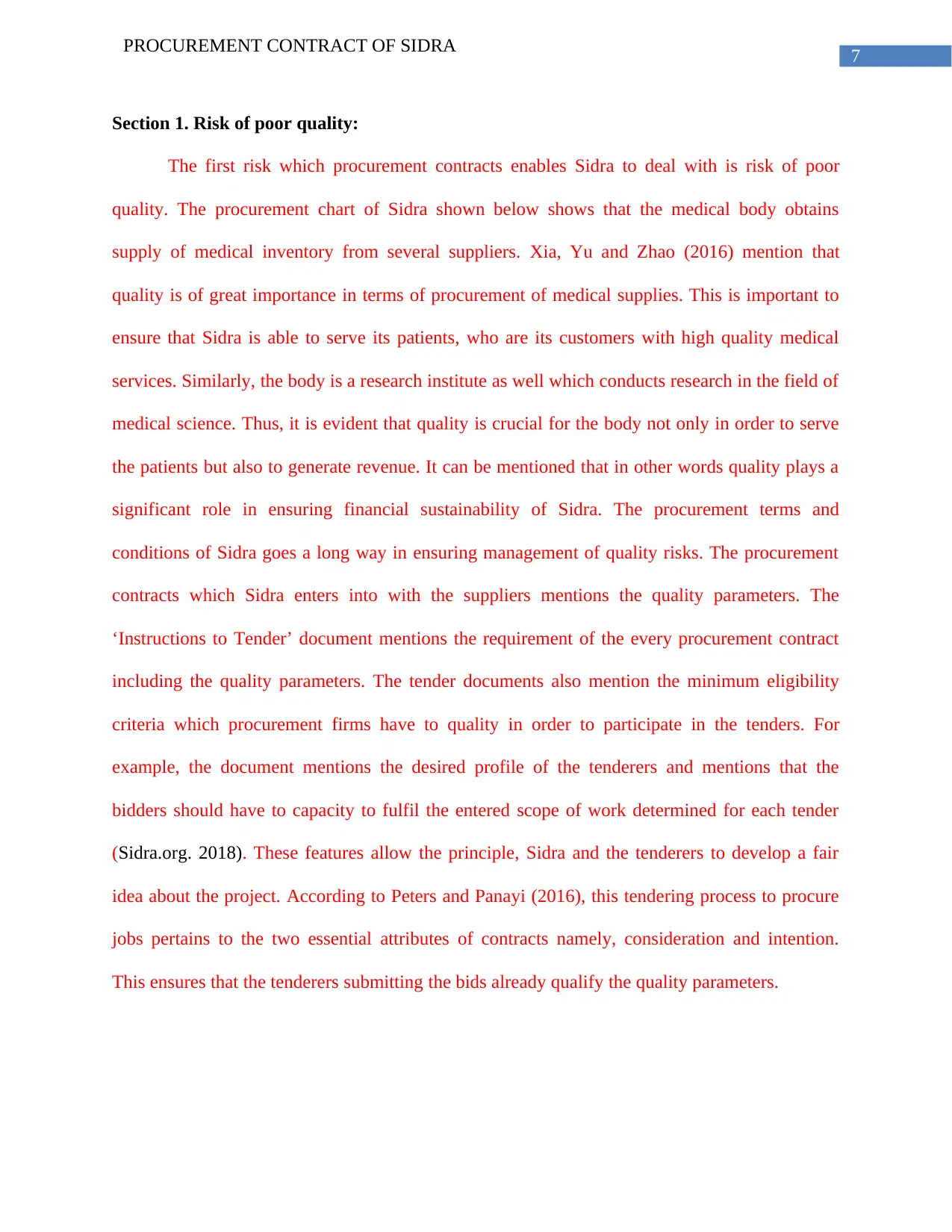
7
PROCUREMENT CONTRACT OF SIDRA
Section 1. Risk of poor quality:
The first risk which procurement contracts enables Sidra to deal with is risk of poor
quality. The procurement chart of Sidra shown below shows that the medical body obtains
supply of medical inventory from several suppliers. Xia, Yu and Zhao (2016) mention that
quality is of great importance in terms of procurement of medical supplies. This is important to
ensure that Sidra is able to serve its patients, who are its customers with high quality medical
services. Similarly, the body is a research institute as well which conducts research in the field of
medical science. Thus, it is evident that quality is crucial for the body not only in order to serve
the patients but also to generate revenue. It can be mentioned that in other words quality plays a
significant role in ensuring financial sustainability of Sidra. The procurement terms and
conditions of Sidra goes a long way in ensuring management of quality risks. The procurement
contracts which Sidra enters into with the suppliers mentions the quality parameters. The
‘Instructions to Tender’ document mentions the requirement of the every procurement contract
including the quality parameters. The tender documents also mention the minimum eligibility
criteria which procurement firms have to quality in order to participate in the tenders. For
example, the document mentions the desired profile of the tenderers and mentions that the
bidders should have to capacity to fulfil the entered scope of work determined for each tender
(Sidra.org. 2018). These features allow the principle, Sidra and the tenderers to develop a fair
idea about the project. According to Peters and Panayi (2016), this tendering process to procure
jobs pertains to the two essential attributes of contracts namely, consideration and intention.
This ensures that the tenderers submitting the bids already qualify the quality parameters.
PROCUREMENT CONTRACT OF SIDRA
Section 1. Risk of poor quality:
The first risk which procurement contracts enables Sidra to deal with is risk of poor
quality. The procurement chart of Sidra shown below shows that the medical body obtains
supply of medical inventory from several suppliers. Xia, Yu and Zhao (2016) mention that
quality is of great importance in terms of procurement of medical supplies. This is important to
ensure that Sidra is able to serve its patients, who are its customers with high quality medical
services. Similarly, the body is a research institute as well which conducts research in the field of
medical science. Thus, it is evident that quality is crucial for the body not only in order to serve
the patients but also to generate revenue. It can be mentioned that in other words quality plays a
significant role in ensuring financial sustainability of Sidra. The procurement terms and
conditions of Sidra goes a long way in ensuring management of quality risks. The procurement
contracts which Sidra enters into with the suppliers mentions the quality parameters. The
‘Instructions to Tender’ document mentions the requirement of the every procurement contract
including the quality parameters. The tender documents also mention the minimum eligibility
criteria which procurement firms have to quality in order to participate in the tenders. For
example, the document mentions the desired profile of the tenderers and mentions that the
bidders should have to capacity to fulfil the entered scope of work determined for each tender
(Sidra.org. 2018). These features allow the principle, Sidra and the tenderers to develop a fair
idea about the project. According to Peters and Panayi (2016), this tendering process to procure
jobs pertains to the two essential attributes of contracts namely, consideration and intention.
This ensures that the tenderers submitting the bids already qualify the quality parameters.
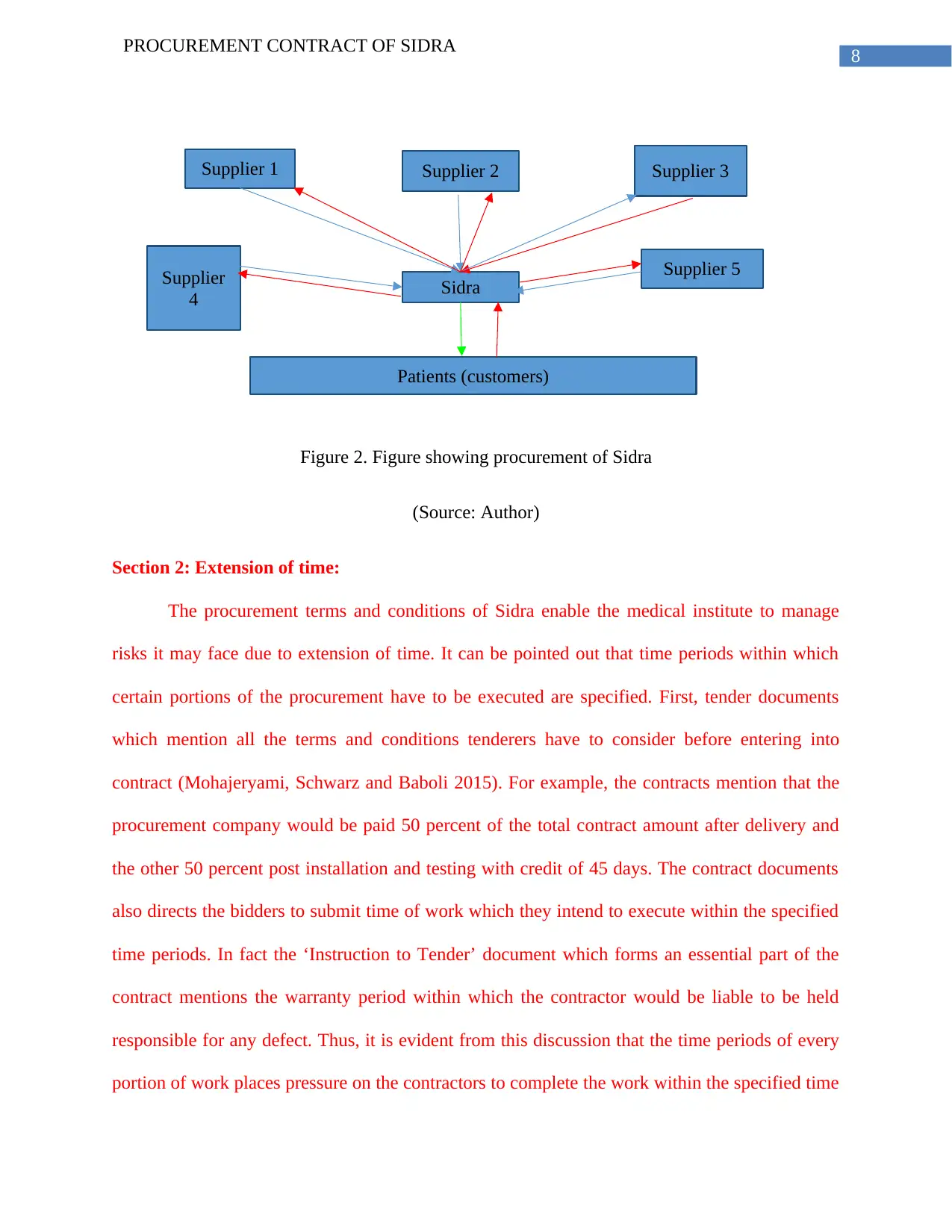
8
PROCUREMENT CONTRACT OF SIDRA
Sidra
Supplier 1 Supplier 2 Supplier 3
Patients (customers)
Supplier
4
Supplier 5
Figure 2. Figure showing procurement of Sidra
(Source: Author)
Section 2: Extension of time:
The procurement terms and conditions of Sidra enable the medical institute to manage
risks it may face due to extension of time. It can be pointed out that time periods within which
certain portions of the procurement have to be executed are specified. First, tender documents
which mention all the terms and conditions tenderers have to consider before entering into
contract (Mohajeryami, Schwarz and Baboli 2015). For example, the contracts mention that the
procurement company would be paid 50 percent of the total contract amount after delivery and
the other 50 percent post installation and testing with credit of 45 days. The contract documents
also directs the bidders to submit time of work which they intend to execute within the specified
time periods. In fact the ‘Instruction to Tender’ document which forms an essential part of the
contract mentions the warranty period within which the contractor would be liable to be held
responsible for any defect. Thus, it is evident from this discussion that the time periods of every
portion of work places pressure on the contractors to complete the work within the specified time
PROCUREMENT CONTRACT OF SIDRA
Sidra
Supplier 1 Supplier 2 Supplier 3
Patients (customers)
Supplier
4
Supplier 5
Figure 2. Figure showing procurement of Sidra
(Source: Author)
Section 2: Extension of time:
The procurement terms and conditions of Sidra enable the medical institute to manage
risks it may face due to extension of time. It can be pointed out that time periods within which
certain portions of the procurement have to be executed are specified. First, tender documents
which mention all the terms and conditions tenderers have to consider before entering into
contract (Mohajeryami, Schwarz and Baboli 2015). For example, the contracts mention that the
procurement company would be paid 50 percent of the total contract amount after delivery and
the other 50 percent post installation and testing with credit of 45 days. The contract documents
also directs the bidders to submit time of work which they intend to execute within the specified
time periods. In fact the ‘Instruction to Tender’ document which forms an essential part of the
contract mentions the warranty period within which the contractor would be liable to be held
responsible for any defect. Thus, it is evident from this discussion that the time periods of every
portion of work places pressure on the contractors to complete the work within the specified time
⊘ This is a preview!⊘
Do you want full access?
Subscribe today to unlock all pages.

Trusted by 1+ million students worldwide
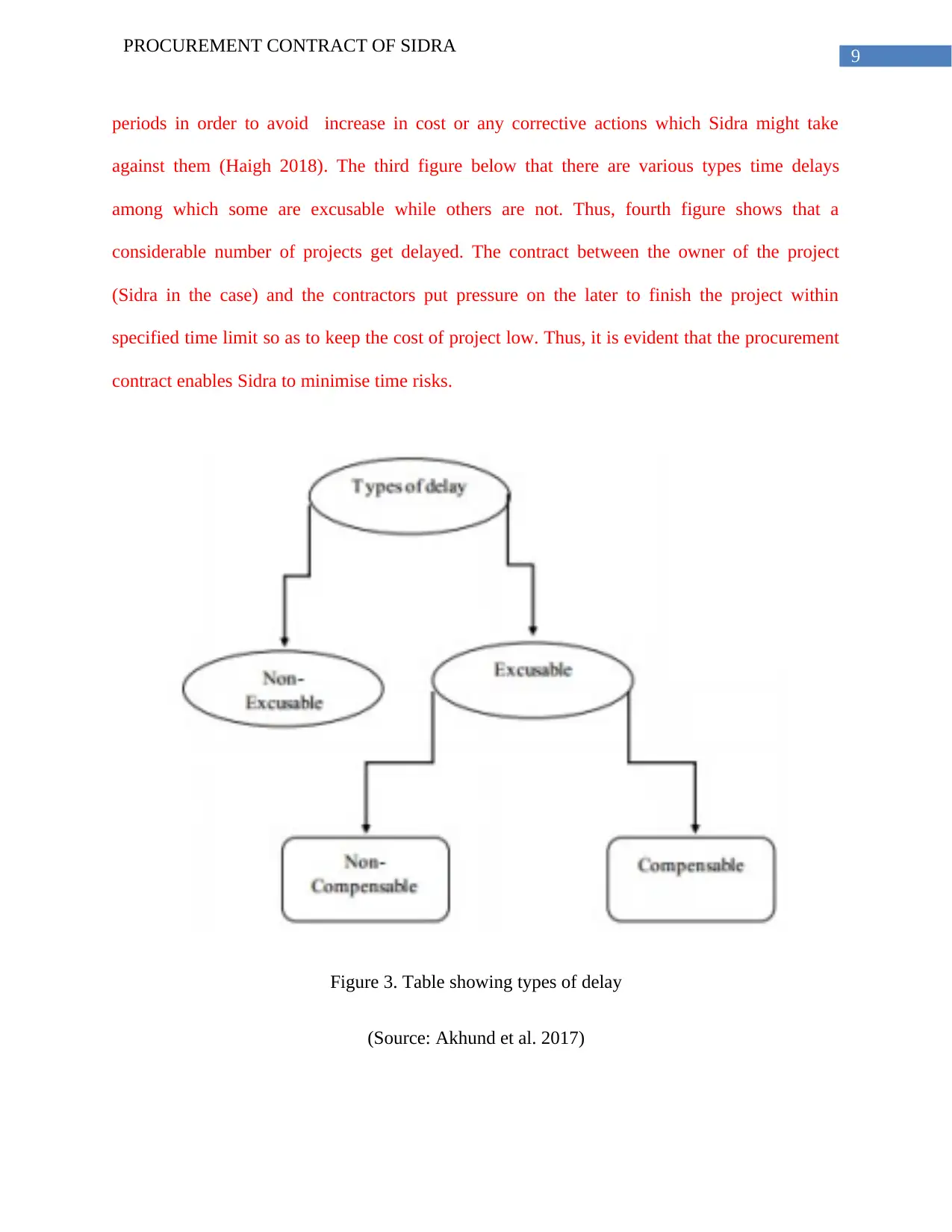
9
PROCUREMENT CONTRACT OF SIDRA
periods in order to avoid increase in cost or any corrective actions which Sidra might take
against them (Haigh 2018). The third figure below that there are various types time delays
among which some are excusable while others are not. Thus, fourth figure shows that a
considerable number of projects get delayed. The contract between the owner of the project
(Sidra in the case) and the contractors put pressure on the later to finish the project within
specified time limit so as to keep the cost of project low. Thus, it is evident that the procurement
contract enables Sidra to minimise time risks.
Figure 3. Table showing types of delay
(Source: Akhund et al. 2017)
PROCUREMENT CONTRACT OF SIDRA
periods in order to avoid increase in cost or any corrective actions which Sidra might take
against them (Haigh 2018). The third figure below that there are various types time delays
among which some are excusable while others are not. Thus, fourth figure shows that a
considerable number of projects get delayed. The contract between the owner of the project
(Sidra in the case) and the contractors put pressure on the later to finish the project within
specified time limit so as to keep the cost of project low. Thus, it is evident that the procurement
contract enables Sidra to minimise time risks.
Figure 3. Table showing types of delay
(Source: Akhund et al. 2017)
Paraphrase This Document
Need a fresh take? Get an instant paraphrase of this document with our AI Paraphraser
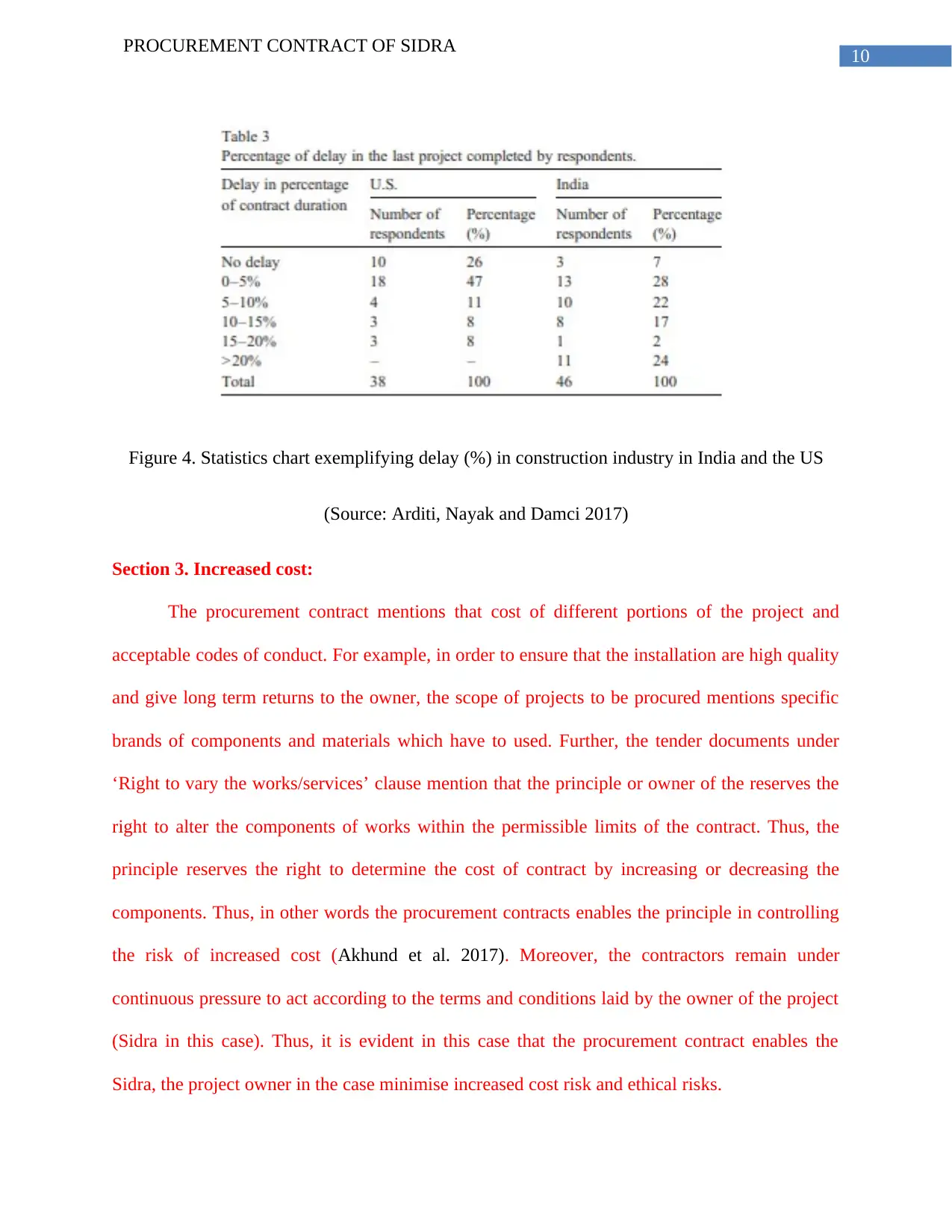
10
PROCUREMENT CONTRACT OF SIDRA
Figure 4. Statistics chart exemplifying delay (%) in construction industry in India and the US
(Source: Arditi, Nayak and Damci 2017)
Section 3. Increased cost:
The procurement contract mentions that cost of different portions of the project and
acceptable codes of conduct. For example, in order to ensure that the installation are high quality
and give long term returns to the owner, the scope of projects to be procured mentions specific
brands of components and materials which have to used. Further, the tender documents under
‘Right to vary the works/services’ clause mention that the principle or owner of the reserves the
right to alter the components of works within the permissible limits of the contract. Thus, the
principle reserves the right to determine the cost of contract by increasing or decreasing the
components. Thus, in other words the procurement contracts enables the principle in controlling
the risk of increased cost (Akhund et al. 2017). Moreover, the contractors remain under
continuous pressure to act according to the terms and conditions laid by the owner of the project
(Sidra in this case). Thus, it is evident in this case that the procurement contract enables the
Sidra, the project owner in the case minimise increased cost risk and ethical risks.
PROCUREMENT CONTRACT OF SIDRA
Figure 4. Statistics chart exemplifying delay (%) in construction industry in India and the US
(Source: Arditi, Nayak and Damci 2017)
Section 3. Increased cost:
The procurement contract mentions that cost of different portions of the project and
acceptable codes of conduct. For example, in order to ensure that the installation are high quality
and give long term returns to the owner, the scope of projects to be procured mentions specific
brands of components and materials which have to used. Further, the tender documents under
‘Right to vary the works/services’ clause mention that the principle or owner of the reserves the
right to alter the components of works within the permissible limits of the contract. Thus, the
principle reserves the right to determine the cost of contract by increasing or decreasing the
components. Thus, in other words the procurement contracts enables the principle in controlling
the risk of increased cost (Akhund et al. 2017). Moreover, the contractors remain under
continuous pressure to act according to the terms and conditions laid by the owner of the project
(Sidra in this case). Thus, it is evident in this case that the procurement contract enables the
Sidra, the project owner in the case minimise increased cost risk and ethical risks.
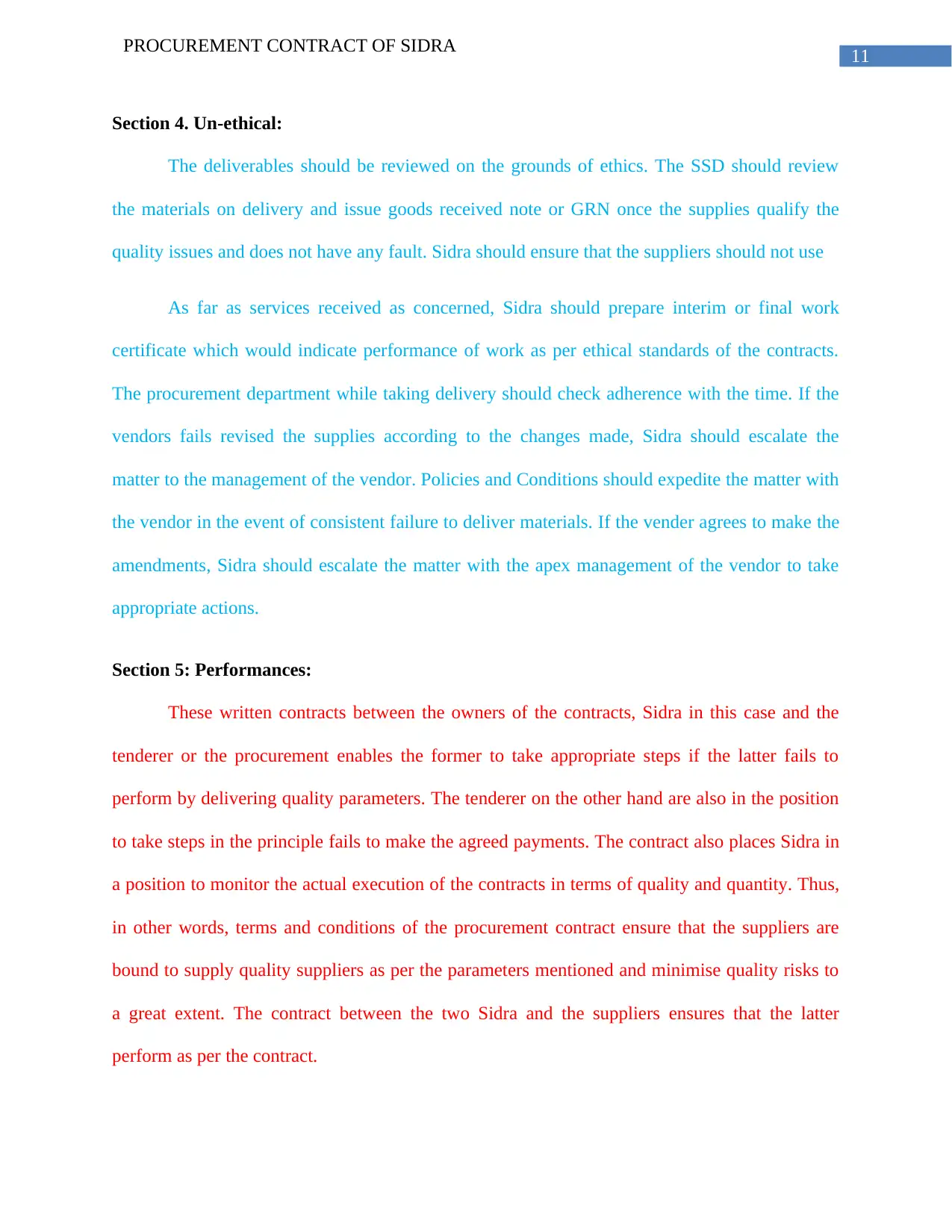
11
PROCUREMENT CONTRACT OF SIDRA
Section 4. Un-ethical:
The deliverables should be reviewed on the grounds of ethics. The SSD should review
the materials on delivery and issue goods received note or GRN once the supplies qualify the
quality issues and does not have any fault. Sidra should ensure that the suppliers should not use
As far as services received as concerned, Sidra should prepare interim or final work
certificate which would indicate performance of work as per ethical standards of the contracts.
The procurement department while taking delivery should check adherence with the time. If the
vendors fails revised the supplies according to the changes made, Sidra should escalate the
matter to the management of the vendor. Policies and Conditions should expedite the matter with
the vendor in the event of consistent failure to deliver materials. If the vender agrees to make the
amendments, Sidra should escalate the matter with the apex management of the vendor to take
appropriate actions.
Section 5: Performances:
These written contracts between the owners of the contracts, Sidra in this case and the
tenderer or the procurement enables the former to take appropriate steps if the latter fails to
perform by delivering quality parameters. The tenderer on the other hand are also in the position
to take steps in the principle fails to make the agreed payments. The contract also places Sidra in
a position to monitor the actual execution of the contracts in terms of quality and quantity. Thus,
in other words, terms and conditions of the procurement contract ensure that the suppliers are
bound to supply quality suppliers as per the parameters mentioned and minimise quality risks to
a great extent. The contract between the two Sidra and the suppliers ensures that the latter
perform as per the contract.
PROCUREMENT CONTRACT OF SIDRA
Section 4. Un-ethical:
The deliverables should be reviewed on the grounds of ethics. The SSD should review
the materials on delivery and issue goods received note or GRN once the supplies qualify the
quality issues and does not have any fault. Sidra should ensure that the suppliers should not use
As far as services received as concerned, Sidra should prepare interim or final work
certificate which would indicate performance of work as per ethical standards of the contracts.
The procurement department while taking delivery should check adherence with the time. If the
vendors fails revised the supplies according to the changes made, Sidra should escalate the
matter to the management of the vendor. Policies and Conditions should expedite the matter with
the vendor in the event of consistent failure to deliver materials. If the vender agrees to make the
amendments, Sidra should escalate the matter with the apex management of the vendor to take
appropriate actions.
Section 5: Performances:
These written contracts between the owners of the contracts, Sidra in this case and the
tenderer or the procurement enables the former to take appropriate steps if the latter fails to
perform by delivering quality parameters. The tenderer on the other hand are also in the position
to take steps in the principle fails to make the agreed payments. The contract also places Sidra in
a position to monitor the actual execution of the contracts in terms of quality and quantity. Thus,
in other words, terms and conditions of the procurement contract ensure that the suppliers are
bound to supply quality suppliers as per the parameters mentioned and minimise quality risks to
a great extent. The contract between the two Sidra and the suppliers ensures that the latter
perform as per the contract.
⊘ This is a preview!⊘
Do you want full access?
Subscribe today to unlock all pages.

Trusted by 1+ million students worldwide
1 out of 18
Related Documents
Your All-in-One AI-Powered Toolkit for Academic Success.
+13062052269
info@desklib.com
Available 24*7 on WhatsApp / Email
![[object Object]](/_next/static/media/star-bottom.7253800d.svg)
Unlock your academic potential
Copyright © 2020–2026 A2Z Services. All Rights Reserved. Developed and managed by ZUCOL.





